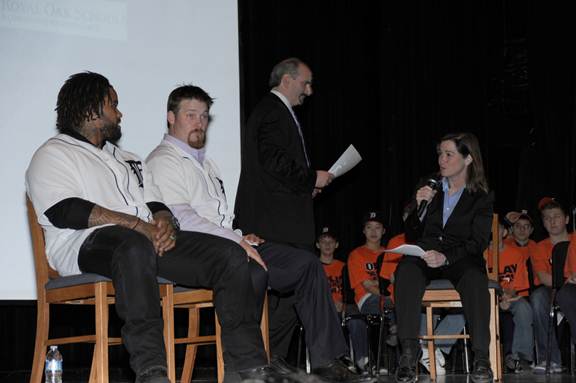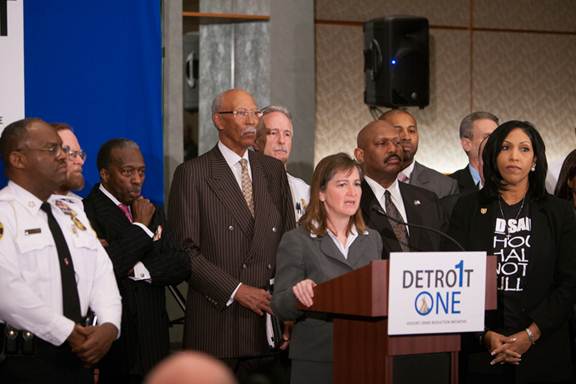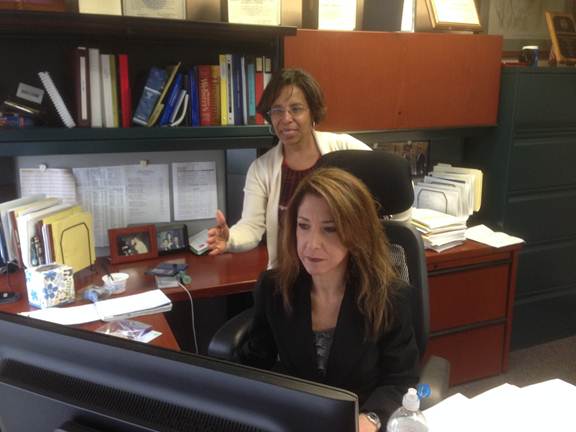Annual Report for 2013
Eastern District of Michigan
Annual Report for 2013

Enforcement, Prevention, Community Trust
In 2013, the men and women of the U.S. Attorney’s Office for the Eastern District of Michigan focused on our mission to improve the quality of life for our citizens. We continued to prioritize cases and lead initiatives that will have a meaningful impact on our region. As U.S. Attorney General Eric H. Holder, Jr., has stated, federal attorneys should not be just case processors, but community problem solvers.
To maintain transparency and accountability, this report contains some of the highlights of our work from 2013. Despite budget cuts from Congress and staff reductions caused by the continuing Department of Justice hiring freeze, the lawyers and support professionals in our Detroit, Flint and Bay City offices, along with our partner agencies, achieved significant accomplishments this year. Among them:
Former Detroit Mayor Kwame Kilpatrick was convicted at trial of public corruption charges for using the mayor's office as a criminal enterprise to enrich himself and others. He was sentenced to 28 years in prison. More than 30 other members of his administration and associates were also convicted of federal offenses.
The Detroit One Violent Crime Reduction Partnership and Flint priority offender program targeted the "worst of the worst" armed criminals and violent drug traffickers. Homicide rates in Detroit declined by 14 percent and in Flint by 16 percent.
The mastermind of a $50 million investment fraud scheme that robbed seniors of their life savings was convicted at trial and sentenced to 20 years in prison.
A former Michigan Supreme Court Justice was convicted and sentenced to 12 months in prison for committing mortgage fraud by concealing assets from the lender to obtain a short sale on a residential property.
Our office collected $219 million in fiscal 2013 in judgments, fines, restitution and forfeiture, more than eight times our entire office budget of $25 million. These funds are being returned to victims and taxpayers.
Our lawyers and support professionals dedicated our efforts to the three pillars of our work -- enforcement, prevention and community trust. We also sought to improve the way we do our work to better serve our citizens.
Enforcement. Our enforcement efforts continued to address our priority areas: terrorism, violent crime, financial fraud, public corruption and civil rights. To improve public safety and the fair administration of justice, we implemented the Attorney General's "Smart on Crime" initiative, focusing our limited resources on significant federal interests, developing an enhanced violent crime enforcement and re-entry strategy and becoming more selective in seeking charges that carry substantial mandatory minimum sentences in drug cases to focus on violent offenders and major drug trafficking organizations.
Prevention. Equally important to enforcement is prevention. Our office led a number of efforts designed to prevent crime. Prevention improves public safety without the societal, personal and monetary costs of arrest and incarceration. In addition to our ongoing programs, we implemented the Ceasefire intervention strategy, which has been successful in Boston and Chicago, and the Flint Youth Initiative, designed to provide mentoring to at-risk youth.
Community Trust. We continued our efforts to build community trust in law enforcement, so that we can be more effective in serving our citizens. When citizens feel empowered to work with police and report when they are victims or witnesses to crime, they contribute to improving public safety. We led and participated in community events throughout the Eastern District of Michigan to break down barriers and engage our residents to work together.
Striving To Improve. Finally, we continued to seek ways to improve our internal processes, so that we can be more effective in our work and better serve our citizens in these times of scarce resources.
Serving Our Region. Federal jurors and grand jurors consistently comment on how impressed they are with the diligence of the dedicated public servants who work in the U.S. Attorney’s Offices in Detroit, Flint and Bay City. While some of our cases result in headlines, most are handled quietly by the professionals in these three offices. We are grateful for our partnership with law enforcement agents, who risk their lives to protect public safety. We are privileged to serve the citizens of the Eastern District of Michigan. We constantly strive to improve ourselves, and we work every day to improve the quality of life in our community.
ENFORCEMENT
Public Corruption
Attacking public corruption in federal, state and local government remains a high priority. Corruption in government corrodes society by discouraging respect for the law, squandering the public's hard-earned tax dollars from being spent on the best outside services at the lowest cost, harming honest businesses that play by the rules and preventing good people from seeking public office. Our region cannot thrive until we have the honest government at every level that our citizens deserve.
City Officials. Former Detroit Mayor Kwame Kilpatrick was convicted after a six-month trial and sentenced to 28 years in prison, the nation's longest public corruption sentence in recent memory. Charges included racketeering, fraud, extortion, bribery and tax charges. Evidence at trial showed that Kilpatrick used the mayor's office as a criminal enterprise to enrich himself, his friends and his family members. He accepted bribes, conspired with others to extort city contractors and rig bids and defrauded donors to his non-profit Civic Fund by using the funds intended for seniors and youth on personal expenses, such as vacations to luxury resorts, yoga lessons, spa treatments and golf clubs. As part of his sentence, Kilpatrick was ordered to pay more than $4.5 million to the City of Detroit in restitution for his crimes.
City contractor Bobby Ferguson was also convicted of racketeering and extortion charges relating to the awarding of city contracts. He was sentenced to 21 years in prison, the longest sentence in the country for a non-public official in a public corruption case, and was ordered to pay $6.2 million to the city in restitution. The government has seized more than $4 million in criminal proceeds from Ferguson, and we will advocate that those funds be returned to the city.
Kilpatrick’s father, Bernard Kilpatrick, was convicted of tax charges and sentenced to 15 months in prison. More than 30 defendants, including Kilpatrick administration officials and city contractors, were convicted in the city hall investigation. The jury in this case sent a powerful message that Detroit will not tolerate corruption in city government.
In a related case, Calvin Hall, the former Vice President of a Detroit-based construction management firm, pleaded guilty to conspiracy to defraud the federal government. According to court documents, Hall and others submitted false documents to obtain a contract worth more than $11 million to act as the construction manager of the Garden View Estates public housing project, which was funded by a $24 million grant from the U.S. Department of Housing and Urban Development.
Public Corruption Unit Chief Mark Chutkow joined other leaders from business, law enforcement, government, academia and the community to share lessons learned from recent cases at a summit on public integrity and good governance at Wayne State University.
In United States v. Seay, a former Pontiac City Council member was sentenced to 26 months in prison after pleading guilty to bribery. According to the plea agreement, Everett Seay solicited and accepted more than $10,000 in bribes from a man who purported to be a drug dealer, who was seeking a "regulated use" ordinance to open a business to buy and sell gold for the purpose of laundering drug proceeds. Unknown to Seay, the man was actually an undercover FBI agent.
In a case involving the City of Detroit’s pension funds, the general counsel for the pension funds and a former trustee of the Police and Fire Retirement System were added as defendants in a superseding indictment alleging a bribery and kickback scheme. The case had already charged Detroit's former City Treasurer and an investment sponsor. One of the defendants in the case, a former pension advisor, pleaded guilty to conspiring to pay bribes to a city official in exchange for new business from the City of Detroit's pension funds. Bribes included trips to Las Vegas, Florida and Bermuda.
The chief of staff to a former Detroit City Council member, who was a pension fund trustee, pleaded guilty to taking bribes from a pension fund advisor for a proposed investment in the Turks and Caicos Islands.
In United States v. Cromer, Timothy Cromer, the former Chief Administrative and Technology Officer for the Detroit Public Library, was indicted for conspiring to commit bribery in exchange for contracts to provide information technology services. As a result of the bribery schemes, Cromer received kickbacks of about $1.4 million. Former contractors James Henley and Ricardo Hearn both pleaded guilty to the conspiracy charges.
Police Officers: Four Highland Park police officers were charged and pleaded guilty to accepting bribes in exchange for protecting a shipment of cocaine. The FBI began its investigation after being alerted by the Chief of the Highland Park Police Department. Sentences ranged from 12 to 18 months in prison.
County Officials. In United States v. Allebban, the former Director of Enterprise Applications for Wayne County was convicted at trial and sentenced to more than three years in prison for altering documents to obstruct justice. Evidence at trial showed that Allebban was working to conceal an extortion scheme by his supervisor, Tahir Kazmi, the former Chief Information Officer for the county. Kazmi pleaded guilty in 2012 to accepting bribes from a private contractor in the form of cash and trips. He will be sentenced in 2014. Former Deputy Chief Information Officer David Edwards also pleaded guilty to a separate bribery scheme, and was sentenced to 12 months in prison.
In United States v. Grundy, a former Assistant Wayne County Executive pleaded guilty to conspiracy to commit fraud in connection with his work as the former Director of HealthChoice of Michigan. HealthChoice is a corporation established to promote access to health care for the low income and indigent population of Wayne County. According to the plea agreement, Michael Grundy caused the accountant of HealthChoice to wire transfer $400,000 to his co-conspirator Keith Griffin, falsely representing that the payment was pursuant to a contract to develop an electronic medical records system. Griffin also pleaded guilty for his role in the scheme. Both will be sentenced in 2014.
School Officials. In United States v. Campbell, a Detroit Public Schools contract accountant and her daughter, a DPS teacher, were convicted after a five-week jury trial for obtaining more than $500,000 in school funds by fraud. The defendants were charged with program fraud, money laundering and tax offenses for submitting fraudulent invoices from a sham company for books and supplies that were never provided. Sandra Campbell was sentenced to 70 months in prison; her daughter awaits sentencing.
In United States v. Reid, a River Rouge school official was sentenced to five years in prison after her conviction at trial on charges of bribery and mail fraud. The evidence showed that the defendant accepted cash in exchange for preferential treatment for a company that provided tutoring services. The loss to the school district was $160,000.
In United States v. Sledge, a former associate superintendent for Pontiac Public Schools was sentenced to 12 months in prison after pleading guilty to converting $236,000 of school funds to his own use.
We obtained an order from the Sixth Circuit Court of Appeals affirming the convictions and 84-month sentence of Dr. Sherry Washington for fraud and money laundering in two separate proceedings. Her convictions were based on her role as a partner in a sham company that billed the Detroit Public Schools more than $3 million for a “wellness program” for teachers that never materialized.
The “Transcending” sculpture in Hart Plaza commemorates Detroit’s labor legacy. Photo by Assistant U.S. Attorney Craig Weier.
Union officials. In United States v. Townsend, a former business agent and trustee of Teamsters Local 337 pleaded guilty to bribery. At his plea hearing, Michael Townsend admitted to accepting $18,000 in bribes to help prevent Teamsters Local 337 from organizing the employees of a Detroit produce company by creating a front company.
In United States v. Killingsworth, the former President and the former Secretary-Treasurer of Communication Workers Local 84555 in Webberville were sentenced to six months in prison and restitution of $19,197 for embezzling union funds from the defendants’ fellow union members. The defendants were married at the time of the offense, but have since divorced.
Violent Crime
Reducing violent crime is essential to the success of our region. Our citizens should feel safe in our neighborhoods, our homes, our schools and our places of business. While violent crime and homicide rates went down in 2013, they remain intolerably high. With budget cuts throughout our state resulting in fewer law enforcement officers and prosecutors, we have increased our caseloads on the federal side, where penalties are often greater than in the state system. Lawyers and support staff in our Violent and Organized Crime Unit, Drug Task Force, General Crimes Unit and branch offices in Flint and Bay City all worked to reduce violent crime to improve public safety.
Initiatives
Detroit One. We launched this new partnership between law enforcement and the community to tackle violent crime in Detroit. Federal, state and local law enforcement partners, including community prosecutors, began working out of the Detroit Police Department precincts to share information and focus on the "worst of the worst" armed criminals. Community groups helped through outreach, prevention and efforts to defeat the "no snitch" culture.
Federal, state and local law enforcement launched the Detroit One partnership with the community to reduce violent crime in Detroit.
Flint Priority Offender Program. Our Flint office used a strategy similar to the Detroit One initiative to focus on violent armed criminals in the Flint area.
Re-Entry Strategy. Recidivism rates show that nationally, two-thirds of all offenders will commit new crimes, so we have targeted this population for prevention work. In addition to participating in the federal district court’s intensive supervised release re-entry program, our office also continued to conduct an offender call-in program called Face To Face. This ongoing program focuses on improving the likelihood of success for citizens re-entering the community after serving sentences in prison. We called in citizens who were returning from prison to raise their awareness of the consequences of committing new offenses, such as stiff federal sentences and the absence of parole in the federal system. We also provided them with information about services that are available to help them succeed, such as job training and placement, substance abuse treatment and resume writing programs. In 2013, we held programs in Saginaw and Detroit, including our first-ever session for youth offenders at the Juvenile Detention Center in Detroit.
CVRP: We continued to partner with federal, state and local law enforcement agencies in the Comprehensive Violence Reduction Partnership, using information-sharing and data-driven strategies to address firearms offenses and violent crime in Detroit.
Human Trafficking Law Enforcement Working Group: We continued to lead a working group to share information and coordinate training for law enforcement to better recognize the signs of human trafficking victims, who are often hiding in plain sight. We participated at a human trafficking conference in Grand Rapids.
Indian Country: We continued to focus on violent crime occurring on the Saginaw Chippewa Indian Reservation in Mt. Pleasant, meeting with tribal leaders to obtain input on effective enforcement strategies and charging violent crime offenses occurring on tribal lands.
Our lawyers practice at the federal courthouse in Port Huron as well as courthouses in four other cities in the Eastern District of Michigan.
Cases
Our efforts to target the most violent offenders who are harming our public safety resulted in a number of case successes. Some of the more significant cases included the following.
Gang Activity. We used traditional organized crime statutes, such as the Racketeer Influenced and Corrupt Organizations Act (RICO) to attack violent street gangs, one of the greatest threats to public safety in Detroit, Pontiac and Flint. We combined the Ceasefire intervention strategy with targeted enforcement to curb gang violence.
In United States v. Gaskin, a 22-year-old Detroit man was sentenced to 30 years in prison for drug trafficking and witness tampering. The defendant was a member of a violent Detroit street gang known as the Hustle Boys. Evidence showed that the defendant and other members of the Hustle Boys transported thousands of prescription pain pills from Detroit to southern Ohio and West Virginia, where they sold pills out of hotel rooms and three residences they maintained in the area for drug distribution purposes. At times, members of the conspiracy traded pills for firearms and brought some of the firearms back to Detroit, using a house to store drugs, firearms and cash proceeds of drug trafficking.
In United States v. Brewton, six members and associates of the Howard Boys street gang pleaded guilty and six await trial in 2014. Charges include racketeering, murder, distributing narcotics and firearms violations. The group draws its name from an apartment complex in Flint that served as its base of operations.
Twelve members of the Dynasty Mob Bosses gang were convicted and sentenced to terms ranging from eight to ten years. Operating on the east side of Detroit, this group of family members and associates sold heroin, prescription pills and marijuana from three separate houses. Charges included drug conspiracy, distribution of controlled substances and possession of firearms during drug trafficking crimes. Assaults, theft and threats with firearms were a part of their operation. During the arrest of the defendants, five illegal weapons were seized.
In United States v. Nicholson, nine members of the Phantom Outlaw motorcycle club were charged with conspiracy to commit murder in aid of racketeering and related charges stemming from a retaliation plot. The indictment alleged that members of the Phantoms conspired to kill members of a rival motorcycle club during a spate of violence between outlaw motorcycle clubs in the city of Detroit. The case was developed in connection with the Detroit One initiative.
In two separate appeals, we obtained orders from the Sixth Circuit Court of Appeals affirming the convictions of ten of the highest-ranking members of the Highwaymen Motorcycle Club. The leaders had been convicted at trial of racketeering conspiracy and others were convicted of distributing drugs, stealing and selling stolen motorcycles and cars and committing firearms offenses. The Sixth Circuit found that evidence obtained using a court-approved wiretap was properly admitted at trial.
Murder. In United States v. Bennett, a 21-year-old Mt. Pleasant man pleaded guilty to second-degree murder of a four-year-old child on the Saginaw Chippewa Indian Reservation. He faces 35-40 years in prison.
Carjacking. Three Detroit-area men were convicted at trial for conspiring to steal cars to support a chop shop. The defendants conspired with several others to steal high-end vehicles, many by committing armed carjacking, and then to retag the vehicles for sale. One of the men would purchase the stolen vehicles from the two carjackers, alter the vehicle identification numbers, create false documents to file with the Secretary of State and then sell the vehicles to unwitting buyers in Michigan and other states.

The Theodore Levin U.S. Courthouse in Detroit.
Armed Robbery. Our prosecutors used the Hobbs Act and other federal statutes to prosecute defendants committing armed robberies because of the significant harm these crimes cause to public safety.
In United States v. Richardson, a Detroit man was sentenced to 124 years in prison after his conviction at trial on ten counts of robbery and firearms offenses. The evidence showed that Richardson was the leader of a seven-man crew that committed armed robberies of Verizon and Radio Shack stores in Detroit and Eastpointe. During the robberies, defendants would force employees and patrons into storage rooms at gunpoint and then steal the store's supply of cellular telephones. The stolen cell phones would later be sold on eBay.
In another multi-defendant case involving armed commercial robberies, an Oak Park man was sentenced to 57 years in prison after his conviction at trial for committing a series of armed robberies at Citizens Bank in Grosse Pointe Woods and pharmacies in Warren and Ferndale while on parole for murder. His co-defendant, a Hazel Park man, was sentenced to more than 44 years in prison. He was on parole for assault with intent to rob while armed at the time of the robberies.
In United States v. Dismukes, one defendant pleaded guilty to armed robbery of a Radio Shack store in Eastpointe and an AT&T store in Warren. The defendant used an AK-47 to steal cellular telephones at gunpoint. Another defendant pleaded guilty to participating in the robbery of the Radio Shack in Eastpointe as well another armed robbery of a T-Mobile store in Detroit.
In United States v. Clay, three defendants used guns to rob commercial businesses in and around Flint. Defendants pleaded guilty to robbing Subway, Autozone, Advanced Autoparts, Rite Aid, Family Dollar and Dollar General stores. All three defendants await sentencing in 2014.
Bank Robbery. In United States v. Sherer, a Toledo, Ohio, man was sentenced to 45 years in prison after his conviction at trial for armed robbery of a credit union near the Michigan-Ohio border. The evidence showed that Quentin Sherer and his co-defendant, Martin Tucker, entered the bank while wearing masks, pointed guns at tellers and demanded money. Agents matched DNA from one of the masks to Tucker from a blood sample they obtained from a cotton swab he used to stop a bloody nose during an amateur boxing match. Tucker was sentenced to 12 years in prison for his role in the robbery. Sherer awaits sentencing.
In United States v. Payton, a serial bank robber was sentenced to 45 years in prison for recruiting heroin-addicted prostitutes to rob banks in Oakland and Wayne Counties.
In United States v. Mitchell, three men were sentenced to prison terms ranging from 14 to 35 years for committing a series of armed bank robberies in and around Saginaw. Two defendants wore masks and brandished guns while robbing banks. The third defendant was the getaway driver. The defendants were ultimately captured during a high-speed car chase that began in Owosso and ended in Saginaw.

Assistant U.S. Attorney Tony Vance discusses potential firearms charges with ATF Resident Agent in Charge Al Jakubowski in Flint.
Arson and Explosives. In United States v. Darwich, a Beverly Hills, Michigan, man was sentenced to 137 years in prison after his conviction at trial of 33 counts in an arson-for-profit scheme. Darwich and his co-defendants bought houses and businesses in Detroit, burned them down and then submitted false insurance claims totaling $5 million.
In United States v. Kennedy, a Trenton man was sentenced to nine years in prison and a $20,000 fine after his conviction at trial for possessing explosives and making bombs. The evidence showed that the defendant telephoned a bomb threat to Trenton High School, stating that four bombs would be detonated in the school within the hour. The school was evacuated and searched. Later that evening, an explosive device was found in the school parking lot. The next day, defendant detonated another device in the parking lot of an ACO hardware store in Trenton.
Drug Trafficking. We focused our drug enforcement efforts on dismantling large-scale drug trafficking organizations and prosecuting individuals using guns and violence in the drug trade.
In United States v. Faraj, three brothers were among eight defendants charged with distributing marijuana and prescription pills in the Warrendale neighborhood of Detroit in a case developed as part of the Detroit One initiative. According to the indictment, the criminal enterprise led by the Faraj brothers employed numerous teenagers and young men to act as their street level distributors. These young workers regularly had access to firearms supplied by the leaders and used arson as a tactic to create stash houses and to further the enterprise’s narcotics distribution activities.
In United States v. Sharp, 16 defendants pleaded guilty to shipping more than 1,000 kilograms of cocaine and thousands of kilograms of marijuana to the metro-Detroit area from the Sinaloa Cartel in Mexico. The investigation led to the seizure of more than 200 kilograms of cocaine and more than $3 million in case and assets.
In United States v. Valdovino, nine defendants entered guilty pleas for their involvement in a conspiracy to transport $150 million in heroin and cocaine from Mexico to Pontiac. This case involved the seizure of 69 kilograms of heroin, the largest shipment of heroin ever seized in the Eastern District of Michigan.
In United States v. Martinez, 23 defendants were indicted in a scheme involving the transportation of multi-kilogram shipments of cocaine on tractor-trailers from Los Angeles to Detroit and other destinations in the United States. The cocaine originated with a Mexican drug cartel, and the lead defendant was charged with operating a continuing criminal enterprise.
Assistant U.S. Attorney Eric Doeh discusses a drug trafficking case with Drug Task Force Chief David Gardey.
In United States v. Folliard, four defendants pleaded guilty and a fifth, Brent McKinney, was convicted at trial for conspiracy to manufacture methamphetamine. The evidence showed that McKinney was manufacturing methamphetamine in a Port Huron home where a minor child resided. The child’s father, Robert Folliard, and other co-defendants supplied McKinney with pseudoephedrine to manufacture methamphetamine.
In United States v. Peterson, six defendants were convicted for their involvement in importing multi-kilograms of heroin from Tanzania into the metro-Detroit area. Extradition proceedings were initiated against the source of supply for the heroin in Tanzania.
In United States v. Saran, two men were charged after they were caught with 65 kilograms of cocaine in their tractor-trailer as it crossed into the United States from Canada over the Ambassador Bridge.
In United States v. Williams, four residents of northern Michigan were charged with participating in a drug trafficking organization. Members of the conspiracy allegedly transported kilogram quantities of cocaine, crack and heroin from Detroit to the Cheboygan County area, where they delivered the drugs to other distributors and end-users in northern Michigan. Members of the conspiracy were also charged with wiring drug proceeds to individuals in Detroit for the purchase of additional drugs.
In United States v. MacLloyd, the Sixth Circuit Court of Appeals affirmed the conviction and 30-year sentence of the leader of a large-scale cocaine trafficking organization. The defendant bought cocaine in Arizona and had it transported to the Detroit area in vehicles with custom-built hidden compartments. Cash payments were transported back to Arizona in the same vehicles, while the defendant distanced himself from the cocaine and the money by traveling between Michigan and Arizona on scheduled airline flights.
Child Exploitation. Prosecutors in our Project Safe Childhood Program convicted a number of defendants for sexually exploiting children. Child pornography cases are not simply about bad pictures. Real children suffer when defendants manufacture child pornography. The children are physically abused before cameras and smart phones, and then virtually abused again and again forever. Moreover, defendants who are engaged in child pornography offenses often encourage and normalize each other’s sexual attraction towards children through online communications, increasing the number of offenders who sexually exploit children.
In United States v. Austin, a 33-year-old New Baltimore teacher was sentenced to 15 years in prison for producing child pornography. The defendant created an on-line persona of a young woman named “Julie” on Facebook, and then used this false identity to entice numerous minor boys, including former students, to photograph themselves nude and send him the images. At the time of his arrest, the defendant possessed 133 images of minor boys.
In United States v. Murray, a Novi man who was a former priest pleaded guilty to distributing and possessing child pornography. The defendant used peer-to-peer software to trade child pornography with others, including an undercover Homeland Security Investigations special agent. A search warrant executed at the defendant’s home recovered seven different computer devices containing 650 movies and 450 photo images of child pornography. The defendant had served as a Catholic priest within the Archdiocese of Detroit before being removed from public ministry because of substantiated allegations of his prior sexual abuse of a young boy.
In United States v. Wooten, a Macomb Township man was sentenced to 30 years in prison for manufacturing and distributing over the Internet images of himself engaged in sex acts with a three-year-old girl.
General Crimes Unit Chief Kevin Mulcahy and First Assistant U.S. Attorney Jennifer Gorland discuss staffing for a child exploitation task force.
In United States v. Flack, a Detroit man was sentenced to more than 21 years in prison on charges of receiving and possessing child pornography. Evidence established that Flack, who had previously been convicted of sexual battery against a minor, used a peer-to-peer file sharing program to locate and download images and videos of 9- to 10-year-old girls being forced to engage in sexually explicit activities with adults. Agents from the Department of Homeland Security identified more than 7,500 images and videos, some portraying sadistic or masochistic conduct.
In United States v. Hilton and Hollingsworth, two defendants were convicted of conspiring to create and distribute videos of the sexual exploitation of a two-year old girl. Defendant Hollingsworth, a woman from Detroit, created images of the child and distributed them to her boyfriend, Paul Hilton. Hilton, who has two prior convictions involving child pornography offenses, faces a mandatory minimum sentence of 35 years when he is sentenced in 2014. Hollingsworth received a 15-year sentence in July.
In United States v. Merrill, a Central Michigan University Professor was sentenced to almost six years in prison for possessing more than 5,000 images of child pornography.
In United States v. Savader, a 21-year-old Great Neck, New York, man pleaded guilty to Internet extortion and cyber stalking. The defendant allegedly sent anonymous text messages to 15 women stating that he had nude photographs of them and threatening to distribute the nude photographs to the women’s friends and family members unless the women sent him more nude photographs of themselves.
Forced Labor: In United States v. Toviave, an Ypsilanti man was sentenced to 11 years in prison after he was convicted at trial of illegally bringing four minors to the United States from Togo, changing their names, disguising their ages and falsely claiming that they were his own children. He beat them and forced them to work at his home as domestic servants. Alert school officials notified law enforcement about their concerns that the children were being abused.
Legal Assistant Alicia Collier works on exhibits in preparation for a trial.
National Security
Terrorism remained the top priority of the Department of Justice, and our National Security Unit focused on investigations relating to border security, international and domestic terrorism, terrorism financing, export violations, threats, hoaxes, trade secrets and other violations of law that affect our national security.
Initiatives
We continued to coordinate the multi-agency Anti-Terrorism Advisory Council, which brings together officials from the public and private sectors to detect and prevent acts of terrorism. We conducted training for our own Critical Incident Response Team, so that we may be best prepared to prevent and respond to a terrorist attack. We participated in security planning for special events in Detroit, including the North American International Auto Show and the American League Division and Championship Series. We also continued our work with law enforcement partners in Canada to improve communication and cooperation in joint investigations, so that our investigations along the border may become more seamless.
Cases
Border Security. In United States v. Odeh, a naturalized U.S. citizen, who was convicted in Israel for participating in a terrorist bombing, was charged with immigration fraud. The indictment alleged that Odeh was convicted in Israel for her role in bombings of a supermarket and the British Consulate in Jerusalem. The bombings were carried out on behalf of the Popular Front for the Liberation of Palestine ("PFLP"), a designated terrorist organization. According to the indictment, Odeh and others placed multiple bombs at the British Consulate and in the supermarket, where one of the bombs detonated, killing two and injuring others. Odeh was sentenced in Israel to life imprisonment, but was released after ten years as part of a prisoner exchange, and she then returned to the West Bank. The indictment alleged that in 1995, she immigrated to the United States, and naturalized as a citizen in 2004. In her immigration documents, the indictment alleged, Odeh omitted her arrest, conviction and imprisonment overseas, which were material facts for the U.S. government in determining whether to grant her citizenship.
International Terrorism. Our lawyers also handled the appeal of Umar Farouk Abdulmutallab, who was convicted and sentenced to life in prison. He had pleaded guilty to all eight counts in an indictment, including charges of conspiring with Al-Qaeda to bomb a plane over U.S. soil, and attempting to murder 289 victims on board Northwest Flight 253 from Amsterdam to Detroit on Christmas Day 2009. The appeal remains pending.
Trade Secrets. Theft of trade secrets harms our nation's competitive advantage with foreign manufacturers. We prosecute trade secret thefts to deter individuals and corporations from committing this crime and to protect American industry. In United States v. Qin, a former engineer for General Motors and her husband were sentenced following their conviction at trial for stealing 16,000 GM computer files, including trade secret documents pertaining to hybrid vehicle technology, and attempting to sell the technology to a Chinese competitor. General Motors estimated that the value of the stolen documents was more than $40 million. Yu Qin was sentenced to three years in prison and his wife, Shanshan Du, was sentenced to a year and a day in prison.
Threats. A 47-year-old Illinois man pleaded guilty and was sentenced to 13 months in prison for sending threatening communications on the same day that two bombs exploded near the finish line of the Boston Marathon, killing three people and injuring more than 250 others. The defendant posted two threatening messages to the Facebook page of Con-Way Freight, a shipping company where the defendant worked as a contract employee. The threats were received by Con-Way Freight employees in its Ann Arbor office. While no actual explosives were involved, Con-Way evacuated its facility in LaSalle, Illinois, used bomb-sniffing dogs to search for explosive devices and diverted several trucks while facilities were secured, resulting in a loss of approximately $46,000 to Con-Way.
In December, a Dearborn man was sentenced to 41 months in prison after his conviction at trial of threatening employees of DTE Energy. Evidence at trial showed that the defendant, who received a shut-off notice from DTE Energy for failure to pay his power bill, placed two calls to the customer service department threatening to come to their office to kill DTE’s employees. During these telephone conversations, the defendant used racially charged language and threatened “another Sandy Hook,” referring to the mass shooting at a Connecticut elementary school in December 2012.
Financial Fraud
Another enforcement priority is financial fraud and other white collar crimes, which can rob victims of their savings, harm housing markets and businesses, pollute our environment and divert taxpayer funds from programs intended to benefit disadvantaged citizens. Our financial fraud investigations encompassed health care fraud, investor fraud, identity theft, mortgage fraud, environmental violations and intellectual property offenses, among other crimes.
Health Care Fraud. Our criminal and civil attorneys worked closely together, along with the Justice Department's Medicare Fraud Strike Force, to attack health care fraud. We charged doctors, pharmacists and other health care providers with making fraudulent claims to Medicare, Medicaid and other insurance programs, and with diverting prescription drugs for illicit use.
Assistant U.S. Attorney John Neal and Health Care Fraud Unit Chief Wayne Pratt discuss a health care fraud conspiracy case.
In United States v. Fata, an Oakland Township doctor was charged with prescribing chemotherapy after deliberately misdiagnosing patients with cancer. According to the indictment, Dr. Fata submitted fraudulent claims to Medicare for medically unnecessary services, including chemotherapy treatments, Positron Emission Tomograph (PET) scans and a variety of cancer and hematology treatments for patients who did not need them. To further the scheme, Dr. Fata allegedly falsified and directed others to falsify documents. His business, Michigan Hematology Oncology Centers, billed Medicare for approximately $225 million between 2007 and 2013.
In United States v. Awada, two doctors were charged with the illegal distribution of prescription drugs and health care fraud. The indictment charged that Dr. Sam Awada and Dr. Luis Collazo distributed controlled substances, including highly addictive pain pills for no legitimate medical purpose. Both defendants were also charged with billing Medicare and other health insurance programs for medically unnecessary testing and procedures, including x-rays, nuclear cardiac stress tests, electrocardiograms, blood work and injections. The indictment alleged that Dr. Awada used recruiters to bring patients to his offices. After ordering unnecessary medical procedures, Dr. Awada gave controlled substance prescriptions to the recruiter in exchange for cash payments. The recruiter then sold the pills for profit on the illegal street market.
Assistant U.S. Attorney Regina McCullough and Deputy Chief Sarah Cohen discuss a brief in a health care fraud case.
In United States v. Patel, a Canton pharmacist was sentenced to 17 years in prison following his conviction at trial for his role in a $57 million health care fraud and drug diversion conspiracy. Defendants billed Medicare, Medicaid and private insurers for drugs that were never provided or were medically unnecessary. Patients would receive prescription drugs as kickbacks in exchange for their personal insurance information. The lead defendant owned or controlled more than 20 pharmacies in metro-Detroit. Three additional defendants, a podiatrist, a psychologist and a pharmacist, were convicted at a second trial in 2013 of conspiracy to commit health care fraud and to distribute controlled substances. Thirteen additional defendants, including five doctors and four pharmacists, were indicted in the scheme in 2013and face trial in 2014.
In the civil arena, the United States obtained a $4 million settlement of a lawsuit brought under the False Claims Act against a cardiology practice and a hospital in Jackson. The complaint alleged that cardiologists employed by Jackson Cardiology Associates performed medically inappropriate cardiac procedures, including invasive catheterizations at Allegiance Health. Because the unnecessary procedures were paid for by Medicare or Medicaid, the United States was entitled to money damages under the False Claims Act.
We obtained a $2.6 million settlement from an imaging company, Universal Imaging, its owners, and 14 physicians or physician groups to whom the imaging company had paid kickbacks under the guise of “supervision fees.” Universal had offices in Dearborn Heights, Auburn Hills and Ypsilanti. We also obtained an $11.9 million judgment by default against the non-settling physician defendant, Gwendolyn Washington.
We helped organize a prescription fraud summit in Lansing, along with our colleagues from the U.S. Attorney’s Office for the Western District of Michigan and the Michigan Attorney General’s Office. Speakers included representatives from law enforcement, health care, public health, the insurance industry and courts, as well as the Director of the Office of National Drug Control Policy, Gil Kerlikowske.
Investor Fraud. In United States v. Bravata, a Brighton man was sentenced to 20 years in prison after his conviction at trial for orchestrating a $50 million investment fraud scheme. The defendant organized lunch and learn seminars, targeting seniors, whom he robbed of their life savings.
In United States v. Winans, a Maryland man was sentenced to 14 years in prison and ordered to pay restitution for orchestrating an $8 million Ponzi scheme. The defendant sold interests in Saudi Arabian crude oil bonds that did not exist, obtaining investment funds from more than 1,000 victims.
In United States v. Brito, the lead defendant was sentenced to more than 12 years in prison for his role in an investment fraud scheme. Defendant operated a website called "GetMoni.com," which offered high interest rates on short-term investments, including funding "bridge loans" for major air-conditioning installers and extracting gold from an abandoned mine. A Flint tax-return preparer was sentenced to 6 1/2 years in prison for steering his tax customers to GetMoni.com in return for a commission. Two other defendants also pleaded guilty to participating in the scheme, and were sentenced to prison terms ranging from 18 to 71 months.
In United States v. McKnight, Greg McKnight of Swartz Creek was sentenced to 15 1/2 years in prison after pleading guilty to wire fraud for running an online investment scheme called Legisi, in which he offered inflated returns on loans. The program involved more than 3,000 investors with losses of $49 million. His partner, Matt Gagnon, was sentenced to five years in prison for promoting the investment program in an online business review without disclosing that he was receiving compensation.
Assistant U.S. Attorney Patrick Hurford reviews a white collar crime file.
Mortgage fraud. Our office filed a number of mortgage fraud cases, bringing criminal charges and civil claims. Mortgage fraud not only harms the lender, but also harms communities because foreclosures lead to vacant homes that lower property values and become havens for criminal activity.
In January, former Supreme Court Justice Diane Hathaway pleaded guilty to committing bank fraud in connection with the short sale of a home in Grosse Pointe Park. Hathaway admitted that she had concealed assets to qualify for the short sale. She was sentenced to a year and a day in prison and ordered to pay restitution.
In United States v. Duke, a Fenton man was sentenced to 13 years in prison and $94 million in restitution for his role in leading a 16-defendant mortgage fraud conspiracy, which used straw purchasers, false documents and fictitious title companies to obtain more than 400 loans on 150 properties in metro-Detroit. The defendants allowed the loans to default and go into foreclosure. Co-defendant Ryan Zundel was sentenced to 10 years in prison for his role in the scheme. Duke failed to appear to serve his sentence and remains a fugitive.
In United States v. Woolsey, a Grosse Ile businessman was convicted after trial for conspiring and defrauding mortgage lenders in numerous transactions in Michigan and Tennessee. Using his own real estate and appraisal companies, Woolsey orchestrated millions of dollars of fraudulent mortgage transactions by directing the activities of bank employees, buyers, appraisers and closing agents. To complete the scheme, he disguised the source of down payments, provided false and inflated appraisals for properties and provided false income information for buyers to bolster their creditworthiness to qualify for mortgage loans.
In United States v. Nazzal, a Dearborn business man was sentenced to more than nine years and an attorney was sentenced to more than three years in prison after their convictions at trial for conspiracy to commit bank fraud. Their scheme used straw buyers, false tax returns, inflated financial statements and phantom down payments in a series of commercial loan transactions involving Detroit area businesses and gas stations. The two men were also convicted of paying bribes to a former bank official in connection with the fraudulent loans.
In a separate case, Nazzal was sentenced to 33 months in prison for operating an immigration fraud ring from one of his restaurants. The conviction arose from Nazzal’s role in brokering three separate false marriages between U.S. citizens and Lebanese nationals to obtain immigration benefits by fraud.
Money Laundering Compliance. In a case involving money laundering compliance, our office reached an agreement with First Independence Bank of Detroit regarding its procedures under the Bank Secrecy Act ("BSA") and anti-money laundering ("AML") regulations. Under the agreement, the bank paid a fine of $250,000 and agreed to maintain procedures regarding customer identification and customer due diligence to permit effective suspicious activity monitoring. The agreement also required guidelines to reasonably ensure identification and timely, accurate reporting of known or suspected criminal activity as required by law. The agreement indicated that, prior to 2009, First Independence Bank had unsatisfactory BSA and AML compliance programs and practices.
Environmental Offenses. Environmental enforcement is vitally important to our district. Clean air and water are among Michigan’s most valuable assets, and their protection is essential to our state’s future.
In United States v. Glover, a Canton computer company owner was sentenced to 2 1/2 years in prison for storing and disposing of hazardous "e-waste" without a permit, as well as for trafficking in counterfeit goods and services. Mark Glover's company, which brokered used electronic components, used counterfeit labels to conceal the age of cathode ray computer monitors that were exported overseas. Older cathode ray monitors are known to contain hazardous, toxic levels of lead, and are subject to proper disposal laws because the lead can contaminate drinking water.

The Detroit People Mover connects downtown’s architectural gems.
In United States v. Saad, a Dearborn man was sentenced to 14 months in prison after pleading guilty to criminal violations of the Clean Air Act. The defendant was hired as a demolition contractor to tear down a vacant commercial warehouse in Dearborn and dispose of the demolition debris. Rather than pay for the proper removal of the asbestos, Saad hired workers to tear down the warehouse without following proper procedures under the Clean Air Act’s asbestos regulations.
In United States v. Bradley, two men were charged with violating the Clean Air Act for knowingly and improperly removing asbestos-containing material from a Bay City church. The church was being converted to a school building to be used by the Bay City Academy.
In United States v. Montgomery, a former candidate for Mayor of Detroit and for Congress was convicted of mail fraud and sentenced to 15 years in prison. A jury found Duane Montgomery, Jr., guilty after hearing evidence that he submitted a series of false claims to British Petroleum and victim funds. The defendant sought compensation for damages to a boat he falsely claimed to have been operating in the Gulf of Mexico at the time of the Deepwater Horizon oil spill.
Intellectual Property. In United States v. Edward, a northern Michigan man was convicted at trial of criminal copyright infringement and mail fraud. Evidence at trial showed that the defendant purchased more than 2,500 copies of counterfeit Microsoft software from various suppliers located primarily in China, Singapore and the United States, and sold them on eBay to unwitting buyers. The retail value of the software was more than $1 million.
Mail Fraud. In United States v. Wilson, a Yale, Michigan, man was sentenced to 20 years in prison for committing a $2.6 million fraud scheme targeting friends and family members of prisoners incarcerated across the United States. The defendant sent mailings to prisoners, falsely offering legal services to overturn convictions and reduce sentences, but, in fact, never provided any services. The victims lost money and were denied the legal services they sought.
Program Fraud. Nine individuals were charged on food stamp fraud charges for allegedly exchanging cash for food stamp benefits. Defendants obtained food stamp recipients’ Bridge Cards and took them to the various stores in Detroit’s Eastern Market Terminal, where retailers allegedly agreed to "work the cards." These transactions totaled millions of dollars in government reimbursements during the past year.
Eleven individuals were charged for their roles in four separate Michigan-based federal student-loan fraud schemes totaling more than $1 million. The rings allegedly exploited online education programs to fraudulently obtain federal student aid for applicants posing as prospective college students.
In United States v. Linseman, a Detroit woman was sentenced to 32 months in prison for stealing more than $385,000 in federal and state grant funds designated to Lighthouse of Oakland, a non-profit organization in Pontiac dedicated to helping the homeless. During a four-year period, Linseman misdirected funds designated for rental housing for the homeless to her friends and relatives as fictitious landlords.
In United States v. Moore, the founder and former executive director of the non-profit domestic violence organization Looking for My Sister pleaded guilty to federal program fraud for misappropriating funds the organization received through federal grants. Laurie Moore admitted to using grant funds to purchase goods and services for her personal use and the use of her family. She will be sentenced in 2014.
Tax Evasion. In United States v. Atkins, a former resident of Troy pleaded guilty and was sentenced to six years in prison for operating an advanced fee fraud scheme and committing tax evasion. Records showed that Atkins, falsely portraying himself as a hedge fund manager, solicited large advanced fees by falsely promising to arrange commercial loans for more than 50 individual and commercial clients throughout the nation. In fact, Atkins used the fees on his own personal expenses. He was ordered to pay $1.7 million in restitution to his victims as well as $270,094 to the IRS.
In United States v. Csolkovits, a Bloomfield Hills man was convicted and sentenced to 27 months in prison for impeding tax laws and presenting false documents to the IRS. According to court records, Csolkovits solicited more than $2 million from investors to manufacture products he never produced, such as an all-natural rodenticide, which Csolkovits promised to have approved by the EPA and then produced and sold. Csolkovits spent much of the money for personal expenditures, and filed no corporate or individual tax returns. During an IRS audit, Csolkovits made false statements and provided false documents, including a license agreement with a company in the Bahamas that turned out to be a shell corporation.
Forfeiture and Financial Litigation Unit Chief Julie Beck led the collection efforts that recovered $219 million in fines, judgments, restitution and forfeitures for victims and taxpayers in fiscal 2013, more than eight times the office's annual budget.
Civil Rights
Our Civil Rights Unit continued its robust enforcement efforts in 2013. Civil rights are essential to attracting residents and maintaining a high quality of life in a multi-cultural community like ours. Making all people feel welcome and protected is essential to the population growth necessary to the economic future of Michigan.
Hate Crimes. In United States v. Avery, a Detroit man was sentenced to 18 months in prison after pleading guilty to assaulting another man at a convenience store because of the victim's sexual orientation. The victim suffered a fractured eye socket and other injuries.
Fair Lending. We assisted the Civil Rights Division and the Consumer Financial Protection Bureau in obtaining a $98 million settlement against Ally Financial to resolve allegations of discrimination in administering auto loans to more than 235,000 African-American, Hispanic, Asian and Pacific Islander borrowers.
Disabilities Rights. We obtained a $60,000 settlement under the Americans with Disabilities Act (“ADA”) with the Golden Corral restaurant in Westland after a manager discriminated against a family with children with a genetic skin disorder. The mother informed the manager that the disorder, epidermolysis bullosa, which causes blisters to appear on the skin, is not contagious, but the family was nonetheless asked to leave. The law prohibits places of public accommodation from discriminating against people on the basis of disability. In addition to paying damages and a penalty, the restaurant agreed to develop a non-discrimination policy and to train employees to serve customers with disabilities.
We also reached an agreement with Palace Sports and Entertainment under the ADA for extensive changes to improve physical accessibility and opportunities for people with disabilities at The Palace of Auburn Hills, home of the Detroit Pistons. The settlement agreement resolved complaints filed by patrons with disabilities who were unable to attend events at The Palace, as well as a complaint from the Michigan Paralyzed Veterans of America. Under the settlement agreement, Palace Sports will provide at least 99 wheelchair accessible seats, and an equal number of companion seats, dispersed throughout The Palace, and will provide people in wheelchairs with lines of sight that are comparable to those offered to individuals without disabilities. Palace Sports also agreed to improve accessibility in restrooms, restaurants, concession stands, parking areas, suites and dressing rooms, to improve signage throughout The Palace and to annually train its employees on the ADA.
Police Practices. We continued to work with the City of Detroit to reach full compliance with the consent decree between the Department of Justice and the Detroit Police Department, increasing compliance to 93 percent. Achieving benchmarks in training, warning systems and equipment, such as in-car cameras, will make Detroit a model police agency.
Voting Rights. We continued to work with the City of Flint to obtain compliance with a settlement agreement to improve access to polling places for voters with mobility impairments. We worked with the City Clerk's Office to provide technical assistance, and monitored polling places on primary and general election days.
Defensive Litigation Chief Vanessa Mays and Civil Rights Unit Chief Judy Levy discuss a civil settlement.
Other Civil Cases
Our office is also responsible for representing the United States in court in civil matters. Our Civil Defensive Litigation Unit protected taxpayer funds from frivolous and unsupported claims, and fairly resolved other matters.
Employment. In Greene v. Shinseki, we obtained an order granting summary judgment for the Veterans Administration Hospital in Detroit, finding no evidence that the plaintiff, a registered nurse, was terminated because of gender discrimination. Instead, the court concluded that her termination was based on a series of patient complaints and attendance issues.
Bivens In Van Beek v. Robinson, we obtained a judgment at trial on behalf of two female Customs and Border Protection officers. The jury found that the plaintiff, who was seeking $4 million in damages, failed to prove her claim that she was sexually groped during a patdown search at the Ambassador Bridge.
Torts. In Neal v. United States, the court granted summary judgment for the United States in a case involving an auto accident between the plaintiff and a federal agent pursuing a shooter. The plaintiff was seeking $1.3 million in damages. The court found that the agent had exercised appropriate caution as he proceeded through an intersection, and that the plaintiff had heard the siren but continued to drive into the path of the agent.
PREVENTION
In addition to our enforcement efforts, the U.S. Attorney’s Office continued to work on preventing crime. We believe that an effective way to reduce crime is to prevent it from occurring in the first place. History has shown that we cannot simply arrest our way out of our crime problems, and that long-term reductions in crime require efforts to attack the root causes of crime.
Honest Government Forum. Along with The Michigan Chronicle, the Federal Bar Association and Wayne State University Law School, our office organized a forum on open and honest government to share lessons learned from the investigation of former Detroit Mayor Kwame Kilpatrick. The forum featured speakers from government, law, law enforcement, business, labor, academia, media and the community. Speakers encouraged whistleblowers to come forward, and indicated that new policies have already improved transparency in city government, such as requiring disclosures of conflicts of interest and banning gifts.
National Forum on Youth Violence Prevention. We continued to work with the Department of Justice to facilitate the City of Detroit’s plan to reduce youth violence. The plan resulted from a series of listening sessions with youth, educators, faith leaders, law enforcement officials, public health officials, business leaders and non-profit agencies. Piloting in the areas near Cody High School on the City’s west side and Osborn and Denby High Schools on the east side, the program seeks to reduce youth violence by employing strategies that have proven effective in other parts of the country. The Detroit plan includes a program called Safe Passages, an alternative to expulsion, which provides consequences for inappropriate behavior while allowing students to continue their education. The plan also includes an initiative called Safe Routes, in which volunteer patrols watch out for students as they travel to and from school, and school Safety Stations, which provide safe places within schools for students to report violence, seek social services and obtain peer-to-peer counseling.
U.S. Attorney General Eric H. Holder, Jr., hosted Keana Pearl and other Detroit high school students at the National Forum on Youth Violence Prevention in Washington, D.C., in September.
We joined with the City of Detroit to organize a youth anti-violence summit that included a presentation on school safety stations, self-defense tactics, safe routes to school, and a hip hop rap contest in which teens competed by performing rap songs with an anti-violence message.
Ceasefire Detroit. Another part of the Youth Violence Reduction Plan, known as Ceasefire, seeks to reduce homicides. By analyzing data provided by police and community members, Ceasefire organizers identified potential trigger pullers, called them in to communicate the community’s expectation of non-violence and provided them with opportunities to obtain services to help avoid violence. Individuals who were identified through Ceasefire for assistance and then committed acts of violence were held accountable through arrest and prosecution.
Anti-Bullying Forum. We partnered with the Detroit Tigers to hold a forum for students at a Royal Oak middle school to discuss the problem of bullying in schools. Tigers players Prince Fielder and Phil Coke and play-by-play broadcaster Mario Impemba discussed strategies for kids to stand up to bullying. Essay contest winners sat onstage with the players and had an opportunity to ask them questions. The program received the Major League Baseball Commissioner's Award for Philanthropic Excellence.

Detroit Tigers Prince Fielder and Phil Coke and play-by-play announcer Mario Impemba discussed anti-bullying strategies with Royal Oak middle school students.
Flint Youth Initiative. We are partnered with the federal district court to form a youth mentoring program, in which elementary school students were matched with a mentor for weekly lunch sessions. Through ongoing relationships with positive role models, the students learn healthy habits for success in school and life.
Explorers. High school students continued to participate in a program at our office where they learn about careers in law and law enforcement, culminating in a mock trial at the federal courthouse before a U.S. District Court Judge.
Project Sentry. Our prosecutors visited dozens of schools to talk to students about the consequences of gun violence, from physical harm to prison sentences.
Project Safe Childhood. Our prosecutors spoke to student and parent groups about Internet safety, sharing stories from cases about Internet child predators and describing ways to safeguard privacy online.
COMMUNITY TRUST
At the U.S. Attorney’s Office, we have worked with our law enforcement partners to improve public trust. We understand that law enforcement cannot be successful without the trust of the people we serve. We need citizens to speak up when they are victims or witnesses to crime, and end the “no-snitch” culture. To achieve that kind of open communication, we need to earn community trust.
To break down barriers between law enforcement and community members, we conducted outreach events throughout the district. We engage with students, civic groups, residents in urban centers, members of the Saginaw Chippewa Indian Tribe, Muslim and Arab populations, Hispanic communities, veterans and military service members, Jewish groups, disabled citizens, seniors, immigrant groups and in the LGBT community. We continued to participate in BRIDGES (Building Respect in Diverse Groups to Enhance Sensitivity), a partnership between government and the Arab and Muslim community. We also worked with ALPACT (Advocates and Leaders for Police and Community Trust), which brings together officials from law enforcement and civil rights groups, participating in meetings for the ALPACT chapters in southeast Michigan, Flint and Saginaw. In November, we attended the first statewide meeting of all ALPACT chapter leaders.
Area faith leaders were invited to visit the federal district court to discuss the importance of jury diversity and jury service.
We continued to work with the U.S. District Court to improve the diversity of jury pools, participating in a public forum in Dearborn to raise public awareness of the importance of jury diversity and jury service. We also participated in a court visit by faith leaders from Dearborn to demystify the court system. The public has more confidence in jury verdicts when the juries reflect the diversity of our region.
We also continued our efforts to improve the diversity of our own office. Although a Department of Justice hiring freeze prevents us from adding new attorneys and staff, we focused on training, developing and retaining personnel from various backgrounds, including minority and majority populations. Our office is more effective and credible when we include people with different perspectives. We participated in a forum on diversity in prosecution at Wayne State University Law School.
We sought to maintain transparency in our work whenever possible. Of course, some of our work is protected from disclosure because of grand jury secrecy rules and privacy laws, but when we can, we let the public know how we are spending our resources on behalf of our citizens.
The U.S. Attorney’s Office convened meetings between border officials and parents in Southwest Detroit.
IMPROVING OUR WORK
The U.S. Attorney’s Office continued to look for ways to improve our own work through management practices, training, coordination of efforts and communication, despite budget cuts and a hiring freeze that has led to reductions in our legal and support staffs. Our Administrative Division implemented a number of new initiatives to utilize technology to improve efficiencies. Among our accomplishments this year:
Training Our Lawyers. We trained our new lawyers in law, ethics and risk assessment, including mandatory annual training for all of our prosecutors to ensure compliance with all legal obligations to provide discovery material to defendants. We conducted Special Emphasis Programs to raise cultural awareness and enhance sensitivity to different cultures and the minority populations we serve.
Training Agents. We conducted training programs for federal agents and state and local law enforcement officers on various topics, including interview techniques, criminal justice in Indian Country, search and seizure, cell phone analysis and computer forensics. More than 4,200 agents and officers received training organized by our office in 2013.
Revising Policies. We implemented the Attorney General's "Smart on Crime" initiative, focusing our limited resources on significant federal interests, developing an enhanced violent crime enforcement and re-entry strategy and becoming more selective in seeking charges that carry substantial mandatory minimum sentences in drug cases.
STAR Committee. Our Support Team Advisory Representatives represented the support professionals in the office to study ways to improve training, office processes, career development and quality of work.
Utilizing Technology. We continued to improve the way we utilize technology for communication, case organization, legal research and administrative matters to reduce costs and improve efficiency.
These are a few of the ways we improved our internal operations during 2013. We constantly seek to improve the way we conduct our business, and will continue to strive to improve in 2014. We welcome your suggestions about how we can improve.
The Tiger outside Comerica Park, here wearing a Red Wings jersey before the Winter Classic outdoor hockey game, symbolizes Detroit’s fighting spirit.
Barbara L. McQuade
United States Attorney
Eastern District of Michigan
Click on icon below to view and print 2013 Annual Report

 U.S. Department
of Justice
U.S. Department
of Justice
















